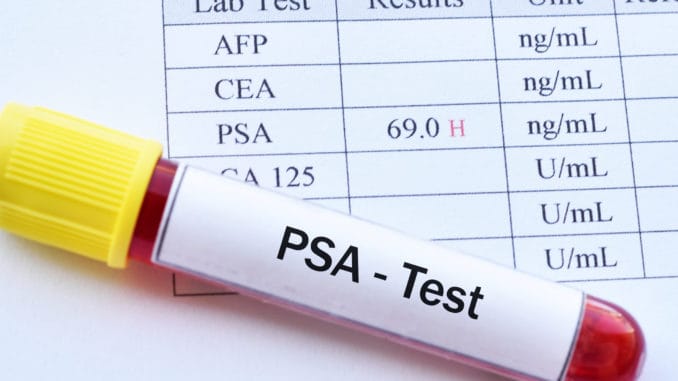
[cmamad id=”22115″ align=”center” tabid=”display-desktop” mobid=”display-desktop” stg=””]
Doctors love to do PSA tests on men… But is it worth it?

—-Important Message—-
How to Shoot Much Bigger Loads (She Will Love This)
Men often just dribble when they should shoot like a fire hydrant…
And this slow, sad dribble doesn’t impress the ladies…
That’s why I’ve discovered a natural formula for men that lets them get those big, impressive “money shot” loads again, just like male adult movie stars…
And it also can help with size and girth as well.
So you can go from a dribble of a few drops to a monstrous load of a tablespoon or more…
These huge masculine loads really impress a girl, they overwhelm her with your masculine power, and she can’t get enough.
But before I tell you exactly how to get these big, impressive loads…
———-
Read This Before Getting a PSA Test (Very Important)
There is almost nothing that makes me angrier than medical tests and procedures that make guys lose their sexual function – sometimes for the rest of their lives.
Especially when those tests do NOTHING to actually help men live longer.
It may seem like an overstatement, but I see it happen time and time again in my work with guys who are suffering from ED.
A man will go in and get his annual PSA screening and end up having major (often unnecessary) surgery that has boatloads of side effects…
…often including bladder problems and problems with sexual function.
Now, before I go any further into this and tell you exactly why I feel this way, it’s important that you know that I am in no way a medical professional.
I can’t give you medical advice. If your doctor tells you to take a PSA test or get surgery, then remember that they are a doctor and I am not.
What I am going to do today is show you how these tests are – according to government research – not good at expanding lifespan…
…and REALLY good at getting men to have lots of surgery.
Then you can draw your own conclusions about what you want to do.

All-cause mortality and why it’s important…
The scariest thing about cancer is that it can kill you – often in a slow and painful process.
And that’s why early cancer screenings are marketed so aggressively.
Cancer is scary. And we’ve been taught over and over again that early detection is the key to a cure.
But… What if, in the case of prostate cancer, early detection doesn’t help you live any longer? Not a smidge longer?
That’s where all-cause mortality comes in.
All-cause mortality is a measurement of death by any cause.
[cmamad id=”22116″ align=”center” tabid=”display-desktop” mobid=”display-desktop” stg=””]
It includes cardiac events, accidents, flu, and any other cause of death.
We should pay attention to this measurement because most measurements that try to determine whether PSA screenings are effective look at death caused by prostate cancer – and not at all-cause mortality.
PSA tests DO work to decrease prostate cancer deaths. But they don’t work to decrease the rate of death overall.
That means that the PSA test – whether or not it leads to cancer treatment – WON’T help you have a longer life.
The PSA test doesn’t do anything for longevity – at all.
“Two added years of follow-up consolidated our previous finding that PSA-based screening reduces prostate cancer mortality but does not affect all-cause mortality.”
For me, I’m not willing to risk potentially disastrous sexual and urinary health consequences in order to get absolutely no benefit to my overall lifespan.
I’m just as likely to die with the screening as without it.
And I’m much more likely to get invasive prostate treatments with the screening. So, I’m willing to take my risks.
You need to decide what risks (or not) you’re willing to take.
This study is interesting because it was done over 11 years of follow-up and it had a solid control group.
That means it’s not a fly-by-night study with a tiny group of people over a short period of time. It’s well designed and well researched.
“The numbers needed invite (NNI) and numbers needed detect (NND) to prevent one prostate cancer death amounted to 1,055 (NNI) and 37 (NND) at 11 years of follow-up and 936 (NNI) and 33 (NND) for the entire follow-up. There was no difference in all-cause mortality.”
Exceptions (at least in my opinion)
One of the reasons that PSA tests don’t work all that well to increase longevity is because MOST prostate cancer is slow growing and doesn’t escape the prostate.
So treating it doesn’t help to increase life span.
But… There some types of prostate cancers ARE very aggressive.
So if you are at higher risk for this type, then make sure you work with your doctor on the proper screening and testing protocols.
For me, this is all about risk management.
I don’t get PSA tests, because on average they don’t extend lifespan.
It’s a waste of money and can lead me down a path with potentially really bad consequences.
Of course, if your risks or risk tolerance are different, then you should make a different decision than I have.
—-Important Message About Prostate Health—-
Have You Been Told These Other Shocking Prostate Facts?
Surprisingly, most men I talk to have never been warned about these other dangerous and sexually catastrophic prostate procedures…
We know now that the PSA test doesn’t extend lifespan…
But what about the TURP procedure?
And what about prostate treatments like Dutasteride and Finasteride?
Men need to know how to best protect their prostates, so they can avoid needless tests and dangerous drugs…
…and continue having sex well into old age with a healthy, fully-functioning prostate.
That’s why I’ve put together this brand new Prostate Solution Bible for men.
It tells you REAL, true solutions to keeping a healthy, sexy prostate for decades to come.
And right now, it’s free.
———-

- Prostate Cancer Mortality at 11 years of Follow-up in the ERSPC
https://www.ncbi.nlm.nih.gov/pmc/articles/PMC6027585/
- Prostate-Specific Antigen (PSA) Test - National Cancer Institute
https://www.cancer.gov/types/prostate/psa-fact-sheet - Time to rethink the debate on PSA testing
https://www.health.harvard.edu/blog/time-to-rethink-the-psa-to-test-or-not-to-test-debate-2017092912463
